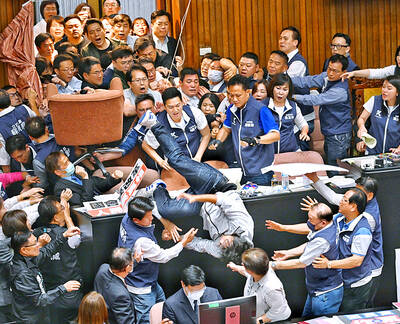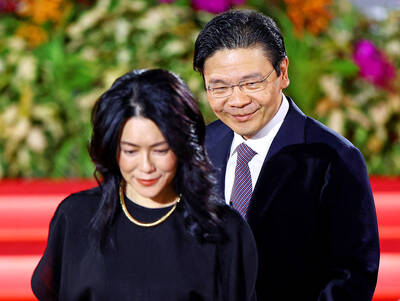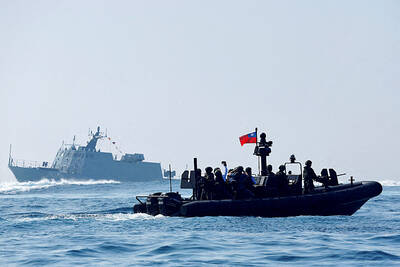Taiwan's lackluster economy will cut into election campaign contributions and is driving joint-campaign efforts, candidates said yesterday.
A decision by five DPP legislative candidates to run together in Taipei City's southern district calling themselves the "five tigers" may be a good way of drawing attention and, of course, votes.
But the joint effort also signifies that times are tough and the sagging economy is going to cut into campaign contributions as much as it does consumer spending, candidates said.
The "five tigers" are: incumbent legislator Shen Fu-hsiung (沈富雄), the "big tiger" (大老虎); Taipei City councilors Lan Mei-chin (藍美津), the "beautiful tiger" (美美虎), and Tuan Yi-kang (段宜康), the "powerful tiger" (威力虎); Chou Po-ya (周柏雅), the "refined tiger" (雅虎); and professor of political science Julian Kuo (郭正亮), the "bright tiger" (亮亮虎).
Holding joint campaigns is commonly used as an election strategy as candidates draw upon their collective effort to secure votes. However, Shen said yesterday the purpose was to cut costs.
"If I run my own campaign separately, the total cost will be lower [than that of joining the group]. However, the per person cost [for the group of five] should be lower yet," Shen said yesterday at a press conference.
Lan, the group's treasurer, said that so far each candidate has already submitted NT$3 million to the group's pot, making a total budget of NT$15 million for their joint campaign. The group also expects to hold two fund-raising banquets in October and November with a pledge of NT$500 per head.
Tuan said that, with the economy in a downturn, he had encountered many occasions when supporters were more unwilling to make donations than they had been in the past.
Looking back on just how dramatically things have changed, Tuan said that during the last elections he only needed to sit down with one major campaign contributor for a few minutes before the supporter handed him a red envelope and sent him on his way. This time around he sat down with the same contributor for two hours and left frustrated, with only a handshake and a few words of advice: "Do your best."
Chou and Kuo, nevertheless, said that they have each raised approximately NT$3 million a piece while the others said that they haven't started fund-raising yet.
It's not all about cutting costs, Kuo said.
Their strategy to get all five elected is based on the fact that "the DPP had obtained a total of 250,000 votes with a turnout rate of 80 percent in the district in the 1998 legislative election."
"Even if the turnout rate declines by five percent this year, the party should still be able to gain 220,000 votes. Therefore, if [the votes] are well distributed, all five of us should be able to obtain at least 40,000 votes and get elected," Kuo told reporters at the same press conference, while Shen added that 32,000 votes would be enough for each to get elected.
Shen said the group would probably ask DPP supporters to vote in accordance with their ID number so as to distribute votes evenly for each DPP candidate in Taipei's southern district.

MUSICAL INTERLUDE: During the altercations, KMT Legislator Hsu Chiao-hsin at one point pulled out a flute and started to play the national anthem A massive brawl erupted between governing and opposition lawmakers in the main chamber of the legislature in Taipei yesterday over legislative reforms. President-elect William Lai (賴清德) is to be inaugurated on Monday, but his Democratic Progressive Party (DPP) lost its majority in the legislature and the Chinese Nationalist Party (KMT) has been working with the Taiwan People’s Party (TPP) to promote their mutual ideas. The opposition parties said the legislative reforms would enable better oversight of the Executive Yuan, including a proposal to criminalize officials who are deemed to make false statements in the legislature. “The DPP does not want this to be

Singapore yesterday swore in Lawrence Wong (黃循財) as the city-state’s new prime minister in a ceremony broadcast live on television after Lee Hsien Loong (李顯龍) stepped down following two decades in office. Wong, formerly deputy prime minister, was inaugurated at the Istana government office shortly after 8pm to become the second person outside the Lee family to lead the nation. “I ... do solemnly swear that I will at all times faithfully discharge my duties as prime minister according to law, and to the best of my knowledge and ability, without fear or favor, affection or ill-will. So help me God,” the

BASIC OPERATIONS: About half a dozen navy ships from both countries took part in the days-long exercise based on the Code for Unplanned Encounters at Sea An unpublicized joint military exercise between Taiwan and the US in the Pacific Ocean last month was carried out in accordance with an international code, the Ministry of National Defense (MND) said yesterday. According to a Reuters report citing four unnamed sources, the two nations’ navies last month conducted joint drills in the Western Pacific. The drills were not made public at the time, but “about half-a-dozen navy ships from both sides, including frigates and supply and support vessels, participated in the days-long exercises,” Reuters reported, citing the sources. The drills were designed to practice “basic” operations such as communications, refueling and resupplies,

‘TOO LATE’: Yu Pei-chen, a Taoyuan councilor and ex-army general, said the Chinese officials were 41 years late in imposing sanctions on him, as he enlisted in 1983 China’s Taiwan Affairs Office (TAO) yesterday announced sanctions against five Taiwanese politicians, pundits and public figures critical of Beijing, accusing them of spreading disinformation about China. The five are: Liu Bao-jie (劉寶傑), Lee Zheng-hao (李正皓), Wang Yi-chuan (王義川), Yu Pei-chen (于北辰), Huang Shih-tsung (黃世聰), TAO spokesman Chen Binhua (陳斌華) told a routine news briefing, adding that the sanctions included their families. They were responsible for making up and spreading false information about China that “deceived some Taiwanese, sowed division ... and harmed brotherly goodwill across the Strait,” Chen said. Speech is not free from the regulations of Chinese law, which punishes manufacturing incorrect